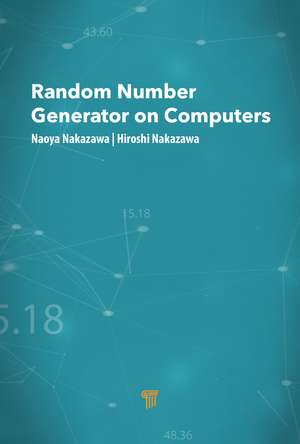Random Number Generators on Computers
Autor Naoya Nakazawa, Hiroshi Nakazawaen Limba Engleză Hardback – 28 noi 2024
Preț: 504.98 lei
Preț vechi: 631.22 lei
-20% Nou
Puncte Express: 757
Preț estimativ în valută:
96.65€ • 100.52$ • 80.100£
96.65€ • 100.52$ • 80.100£
Carte disponibilă
Livrare economică 20 februarie-06 martie
Livrare express 06-12 februarie pentru 26.70 lei
Preluare comenzi: 021 569.72.76
Specificații
ISBN-13: 9789814968492
ISBN-10: 9814968498
Pagini: 120
Dimensiuni: 152 x 229 x 14 mm
Greutate: 0.38 kg
Ediția:1
Editura: Jenny Stanford Publishing
Colecția Jenny Stanford Publishing
ISBN-10: 9814968498
Pagini: 120
Dimensiuni: 152 x 229 x 14 mm
Greutate: 0.38 kg
Ediția:1
Editura: Jenny Stanford Publishing
Colecția Jenny Stanford Publishing
Public țintă
Academic and PostgraduateCuprins
1. Basic Concepts and Tools 2. Group Structures 3. Designs of MC Generators 4. Lattice Structures 5. Regular Simplexes and Regular Lattices 6. Extended Second-Degree Tests 7. MC Generators with Excellent Statistics 8. MC Random Numbers on Spatial Lattices 9. Random Vector Fields and Random Walks 10. Two Addenda and Closing Comments
Notă biografică
Naoya Nakazawa obtained his DSci (applied number theory) at Osaka Prefectural University, Japan. He is now the representative (theory and computing) of Hirakata Ransu Factory (HRF).
Hiroshi Nakazawa obtained his DSci (statistical physics) at Kyoto University, Japan. As a professor at Takuma National College of Technology, Japan, he enjoyed teaching students applied mathematics. He is now the representative (theory and general affairs) of HRF.
Hiroshi Nakazawa obtained his DSci (statistical physics) at Kyoto University, Japan. As a professor at Takuma National College of Technology, Japan, he enjoyed teaching students applied mathematics. He is now the representative (theory and general affairs) of HRF.
Descriere
This monograph proves that any finite random number sequence is represented by the multiplicative congruential (MC) way. It also shows that an MC random number generator (d, z) formed by the modulus d and the multiplier z should be selected by new regular simplex criteria to give random numbers an excellent disguise of independence.
